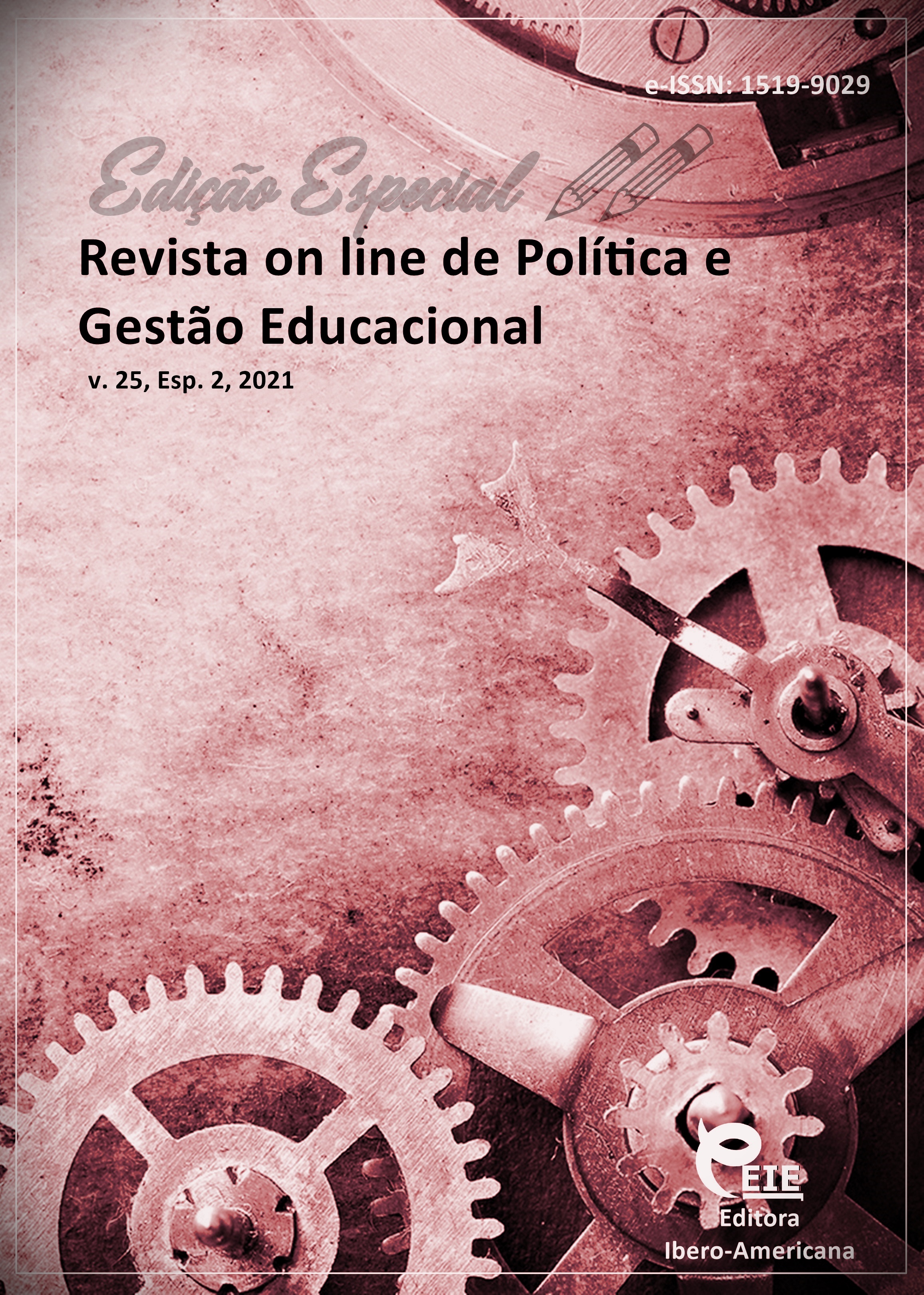O quadro categórico da teoria da formação da criatividade comunicativa de estudantes universitários
DOI:
https://doi.org/10.22633/rpge.v25iesp.2.15277Palavras-chave:
Criatividade comunicativa, Teoria da formação da criatividade comunicativa, Abordagens científicas, PrincípiosResumo
O papel da comunicação, as especificidades e fluxos dos processos comunicacionais e, consequentemente, as exigências de seus participantes, vem crescendo na sociedade moderna e em todas as esferas da atividade profissional. Neste sentido, atualiza-se o problema da formação da criatividade comunicativa dos alunos em fase de formação profissional na universidade. Atualmente, este aspecto da formação profissional de alunos em áreas técnicas carece de atenção tanto na teoria como na prática da educação profissional. O artigo examina os fundamentos teóricos da teoria da formação da criatividade comunicativa de estudantes universitários, interpretada como um conjunto de componentes inter-relacionados e interdependentes que representam uma certa integridade a partir da utilização de um conjunto de abordagens científicas: sistêmica, participativa e discursiva , implementado com base nos princípios: transformação do conteúdo cognitivo em emocional, liberdade de escolha das comunicações, reforço social do comportamento criativo. As abordagens científicas consideradas no artigo foram os alicerces teóricos para o desenvolvimento da teoria da formação da criatividade comunicativa dos estudantes universitários. Os materiais do artigo são de valor prático para a organização do processo de formação profissional no contexto do desenvolvimento da criatividade comunicativa dos alunos.
Downloads
Referências
AKULOVA, I.S. et al. Experiences of tolerance: historical and philosophical analysis of multiculturalism (on the example of Magnitogorsk, Russia). The Social Sciences, Pakistan,. v. 11, n. 3, p. 6532-6535, 2016.
ALEKSEEVA, N. A. Formation of communicative creativity of a future specialist when teaching foreign languages: author’s abstract, Candidate of Psychological Sciences: 19.00.07. 2008. 232 p.
ANTROPOVA, L. G. Improvement of the teacher's communicative competence on the basis of creative reflection (in the context of additional education): author’s abstract, Candidate of Pedagogical Sciences: 13.00.01. 1999. 217 p.
ANTROPOVA, L. I.; LESHER, O.V.; FILATOV, V.V. Humanitarian training of engineers. Bulletin of G.I. Nosov Magnitogorsk State Technical University, v. 2, n. 26, p. 69-71, 2009.
AVERIANOV, A. N. Systematic knowledge of the world: methodological problems. Moscow: Politizdat, 1985. 263 p.
AZARENKO, S. A. et al. Humanitarian encyclopedia: concepts. Center for Humanitarian Technologies, 2002.
BAKHOLSKAIA, N. A. The impact of interactive learning on the development of the professional orientation of pedagogical students of higher educational institutions // Humanitarian and pedagogical research. G.I. Nosov Magnitogorsk State Technical University, v. 1, n. 1, p. 45-49, 2017.
BAKHOLSKAYA, N. A. et al. The impact of interactive model for university student teaching on their professional competence development. Revista Inclusiones, v. 6, n. 2, p. 179-184, 2019.
BLAUBERG, I. V. Formation and essence of the system approach. Moscow: Nauka, 1973. 270 p.
BOIKO, S. A. Teaching literary translation based on cognitive-discourse analysis of the text (English language, language university): author’s abstract, Candidate of Pedagogical Sciences: 13.00.02. 1992. 187 p.
BYSTRAI, E. B. Intercultural and participatory approach as a theoretical and methodological strategy for the formation of intercultural pedagogical competence. Bulletin of Orenburg State University, n. 6, p. 78-83, 2003.
DOLGIKH, M. V. Development of the communicative competence of university students: author’s abstract, Candidate of Pedagogical Sciences: 13.00.08. 2007. 193 p.
GRETSOV, A. G. Training of creativity for senior school and university students. St. Petersburg: Piter, 2008. 208 p.
IAKOVLEV, E. V. Pedagogical concept: methodological aspects of construction: monograph. Moscow: VLADOS, 2006. 239 p.
KARUNNAIA, O. V. Formation of communicative competence of teenagers when working with a fairy tale: author’s abstract, Candidate of Pedagogical Sciences: 13.00.01. 2008. - 237 p.
KAZIKIN, A. V.; LESHER, O. V.; TULUPOVA, O. V. Development of communicative creativity in masters of technical university: methodological aspect. Modern Journal of Language Teaching Methods, v. 7, n. 9, p. 29-40, 2017
KONARZHEVSKII, I. U. A. Pedagogical analysis of the educational process as a factor of increasing the efficiency of general education school management: author’s abstract, Candidate of Pedagogical Sciences: 13.00.01. Moscow, 1980. 32 p.
KUBRIAKOVA, E.S. Towards the concepts of discourse and discourse analysis in modern linguistics: an overview. Discourse, speech, speech activity: functional and structural aspects. Moscow, 2000. p. 5-13.
.
LESHER, O. V. et al. Diagnostics of the development of communicative creativity of university students in the process of intercultural communication. News of the Russian Academy of Education, v. 1, n. 25, p. 83-92, 2013.
LESHER, O. V.; KAZIKIN, A. V. Formation of students' creative identities in schools of higher education: structural and substantive aspects. Modern Journal of Language Teaching Methods, v. 6, p. 244-247, 2016.
MARIANNE, W. et al. Phillips. Discourse analysis. Theory and method. Kharkiv: Publishing house "Humanitarian Center", 2008. 352 p.
MESHCHERIAKOV, B. G.; ZINCHENKO, V. P. (Eds.) The great psychological dictionary: AST; AST-Moscow; Praim-Evrozna. Moscow: 2008. 860 p.
]
PASSOV, E. I. Forty years later or a hundred and one methodical idea. Moscow: GLOSSA-PRESS, 2006. 240 p.
POLAT, E. S. et al. New pedagogical and information technologies in the education system. Moscow: Publishing center “Academiia", 2003. 272 p.
SERIO, P. Discourse analysis in the French school (discourse and interdiscourse). 2. ed. Moscow: JSC IG "Progress", 1999. 416 p.
STUBBS, M. Discourse analysis: the sociolinguistic analysis of natural language. Oxford: Blackwell, 1983. p. 55-93.
Downloads
Publicado
Como Citar
Edição
Seção
Licença
Copyright (c) 2021 Revista on line de Política e Gestão Educacional

Este trabalho está licenciado sob uma licença Creative Commons Attribution-NonCommercial-ShareAlike 4.0 International License.
Manuscritos aceitos e publicados são de propriedade da Revista on line de Política e Gestão Educacional. É vedada a submissão integral ou parcial do manuscrito a qualquer outro periódico. A responsabilidade do conteúdo dos artigos é exclusiva dos autores. É vedada a tradução para outro idioma sem a autorização escrita do Editor ouvida a Comissão Editorial Científica.











